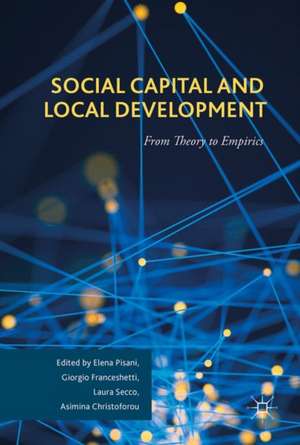Social Capital and Local Development: From Theory to Empirics
Editat de Elena Pisani, Giorgio Franceschetti, Laura Secco, Asimina Christoforouen Limba Engleză Hardback – 10 noi 2017
This book addresses the role of social capital in promoting rural and local development. The recent financial and economic crises have exposed the European Union (EU) to an increased risk of social exclusion and poverty, which are now at the heart of its economic, employment and social agenda with explicit reference to rural and marginal areas (Europe 2020). The authors' work from the notion that rural development is not imposed from the ‘outside’, but depends also on endogenous factors, namely local cultural and ecological amenities, eco-system services, and economic links with urban areas which expand rural opportunities for innovation, competitiveness, employment and sustainable development.
Social capital is of paramount importance because it helps build networks and trusting relations among local stakeholders in the public and private spheres, and supporting the enhancement of governance of natural resources in rural areas
Social capital is of paramount importance because it helps build networks and trusting relations among local stakeholders in the public and private spheres, and supporting the enhancement of governance of natural resources in rural areas
| Toate formatele și edițiile | Preț | Express |
|---|---|---|
| Paperback (1) | 846.21 lei 38-44 zile | |
| Springer International Publishing – 23 aug 2018 | 846.21 lei 38-44 zile | |
| Hardback (1) | 1012.08 lei 43-57 zile | |
| Springer International Publishing – 10 noi 2017 | 1012.08 lei 43-57 zile |
Preț: 1012.08 lei
Preț vechi: 1234.24 lei
-18% Nou
Puncte Express: 1518
Preț estimativ în valută:
193.72€ • 210.50$ • 162.83£
193.72€ • 210.50$ • 162.83£
Carte tipărită la comandă
Livrare economică 21 aprilie-05 mai
Preluare comenzi: 021 569.72.76
Specificații
ISBN-13: 9783319542768
ISBN-10: 3319542761
Pagini: 366
Ilustrații: XXIV, 516 p. 15 illus.
Dimensiuni: 148 x 210 mm
Greutate: 0.79 kg
Ediția:1st ed. 2017
Editura: Springer International Publishing
Colecția Palgrave Macmillan
Locul publicării:Cham, Switzerland
ISBN-10: 3319542761
Pagini: 366
Ilustrații: XXIV, 516 p. 15 illus.
Dimensiuni: 148 x 210 mm
Greutate: 0.79 kg
Ediția:1st ed. 2017
Editura: Springer International Publishing
Colecția Palgrave Macmillan
Locul publicării:Cham, Switzerland
Cuprins
Introduction. -Part I: Social capital and rural development in European regions: a conceptual framework.- .Part II: A methodological approach to the evaluation of the LEADER initiative.- .Part III: LEADER and social capital: a comparative analysis and discussion.- Part IV: LEADER and social capital: regional case studies.- .Part V: Conclusions and policy recommendations.
Notă biografică
Elena Pisani is Assistant Professor of Principles of Economics, Project Planning and Evaluation for Local and Sustainable Development at the University of Padova, Italy.
Laura Secco is Associate Professor in Forest Policy and Governance and in Environmental and Social Responsibility in Local Development Processes at the University of Padova, Italy.
Giorgio Franceschetti is Emeritus Professor of Economics, Rural Planning and Development Cooperation at the University of Padova, Italy.
Asimina Christoforou is Adjunct Professor of International and European Economic Studies at the Athens University of Economics and Business, Greece.
Laura Secco is Associate Professor in Forest Policy and Governance and in Environmental and Social Responsibility in Local Development Processes at the University of Padova, Italy.
Giorgio Franceschetti is Emeritus Professor of Economics, Rural Planning and Development Cooperation at the University of Padova, Italy.
Asimina Christoforou is Adjunct Professor of International and European Economic Studies at the Athens University of Economics and Business, Greece.
Textul de pe ultima copertă
This book addresses the role of social capital in promoting rural and local development. The recent financial and economic crises have exposed the European Union (EU) to an increased risk of social exclusion and poverty, which are now at the heart of its economic, employment and social agenda with explicit reference to rural and marginal areas (Europe 2020). The authors' work from the notion that rural development is not imposed from the ‘outside’, but depends also on endogenous factors, namely local cultural and ecological amenities, eco-system services, and economic links with urban areas which expand rural opportunities for innovation, competitiveness, employment and sustainable development.
Social capital is of paramount importance because it helps build networks and trusting relations among local stakeholders in the public and private spheres, and supporting the enhancement of governance of natural resources in rural areas.
Caracteristici
Provides a close scrutiny of the economic implications of social capital, in particular with regard to European rural areas Focuses on the one-to-one relationship between social capital and governance Proposes an original and unique methodology for understanding and measuring social capital

























